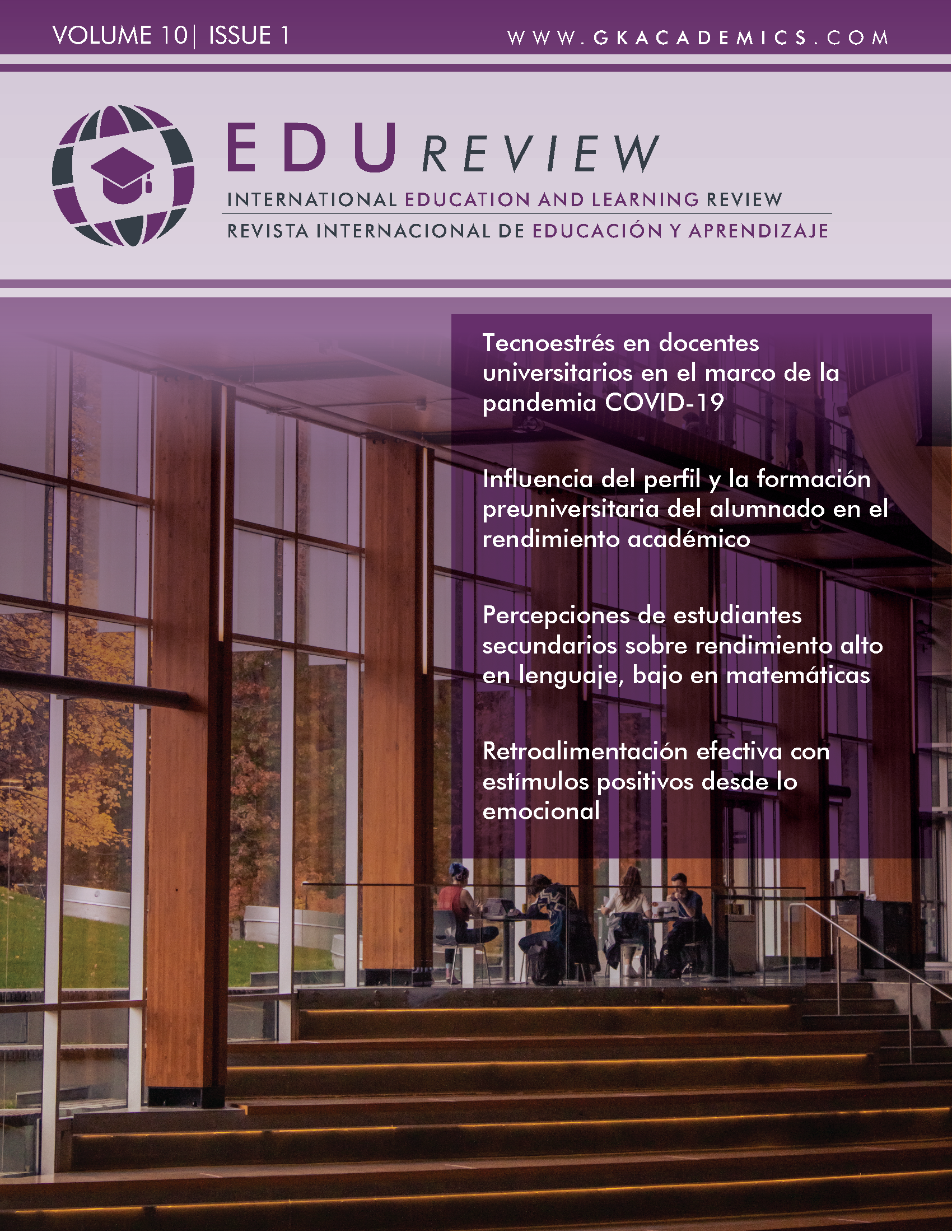Guide-sheet to attend the socio-demographic specificities of the adult student
Proposal within the framework of transactional theories of Distance Education
DOI:
https://doi.org/10.37467/gkarevedu.v10.3184Keywords:
Distance education, Feedback, Moore transactional model, Data sheet, Online coursesAbstract
This paper presents some ideas about a specific phase of communication with the adult student, within the framework of the transactional distance models of Distance Education developed by Moore et al. The need for greater attention by managers and administrators of digital platforms in relation to the quality of the protocols that account for the feedback process aimed at an adult student is suggested. A guide data sheet is proposed, that include the salient dimensions of the particular profile of each student and the alternative communication strategies of the instructional system so that the latter can be adjusted to the demands and personalized features of each participant.
Downloads
Global Statistics ℹ️
|
372
Views
|
98
Downloads
|
|
470
Total
|
|
References
Adam, F. (1987). Andragogía y Educación Universitaria. Federación Interamericana de Educación de Adultos.
Alcalá, A. (2010). Andragogía. Universidad Nacional Abierta.
Burbules, N. y Bruce, B. (2001). Theory and Research on Teaching as Dialogue. En V., Richardson (Ed.), Handbook of Research on Teaching. American Educational Research Association. 4th Edition.
Castillo Silva, F. (2018). Andragogía, andragogos y sus aportaciones. Voces De La Educación, 3(6), 64-76. Dialnet-AndragogiaAndragogosYSusAportaciones-6521968.pdf .Consultado el 14 de diciembre de 2021
Dafonte-Gómez, A. Martínez-Rolán, X. y García-Mirón, S. (2017) La investigación sobre engagement en e-learning. Grupo de Innovación Docente MDAP: Medios Digitales y Aprendizaje Participativo, Universidad de Vigo. comunicacion_ENGAGEMENT_EDUcaMED17 (1).pdf Consultado el 05 de diciembre de 2021
García-Aretio, L. (2011). Perspectivas teóricas de la EAD y virtual. Revista española de pedagogía, 249, pp. 255-271.
González-Miy, D., Herrera-Díaz, L. E. y Díaz-Camacho, J. E. (2015). El modelo de Comunidad de Indagación
https://www.researchgate.net/publication/273764931_El_modelo_de_Comunidad_de_IndagacionConsultado en diciembre de 2021
Holmberg, B. (1999). The conversational approach to distance education. Open learning, 14(3), 58-60. DOI: https://doi.org/10.1080/0268051990140309
Knowles, M. (2006) Andragogía. Oxford.
Lopategui, E. (2021). Integración Efectiva de la Teoría de la Distancia Transaccional en las Plataformas Virtuales: Implicaciones para la Retención de los Estudiantes en los Cursos en Línea. KÁLATHOS. Revista Transdisciplinaria Metro Inter. Disponible en: https://www.researchgate.net/publication/349454072_Integracion_Efectiva_de_la_Teoria_de_la_Distancia_Transaccional_en_las_Plataformas_Virtuales_Implicaciones_para_la_Retencion_de_los_Estudiantes_en_los_Cursos_en_Linea Consultado en 28 de noviembre de 2021
Moore, M. (1993). Theory of transactional distance. In D. Keegan (Ed.), Theoretical Principles of Distance Education. Routledge.
Prada-Rodríguez, M. (2020) El sentido de la orientación pedagógica desde los imaginarios simbólicos de los profesores universitarios [Tesis de Grado presentada como requisito para optar al Título de Doctora en Ciencias de la Educación]. UNESR.
Real Academia Española. (s.f.). Ejecutar. En Diccionario de la lengua española. Recuperado en diciembre de 2021, de https://dle.rae.es/ejecutar?m=form
Real Academia Española. (s.f.). Medir. En Diccionario de la lengua española. Recuperado en diciembre de 2021, de https://dle.rae.es/medir?m=form
Salgado-García (2016) Diálogo y aprendizaje percibido: Las experiencias de los estudiantes como indicadores de calidad en la educación virtual. V Foro Costarricense de Educación Virtual Universidad Técnica Nacional (UTN), Costa Rica. Noviembre. PonenciaEdgarSalgadoUTN2016.pdf Consultado en noviembre de 2021
Torres, M., Fermín, Y., Arroyo, C. y Piñero, M. (2000) La horizontalidad y la participación en la andragogía. Educere, 4(10), 25-34. Universidad de los Andes Mérida, Venezuela. https://www.redalyc.org/pdf/356/35641004.pdf Consultado el 10 de diciembre de 2021
Viera-Barros, D. (2011) Estilos de aprendizaje y medios didácticos en contextos virtuales [Tesis de grado]. UNED. https://dialnet.unirioja.es/servlet/tesis?codigo=26719
Downloads
Published
How to Cite
Issue
Section
License
Those authors who publish in this journal accept the following terms:
-
Authors retain copyright.
-
Authors transfer to the journal the right of first publication. The journal also owns the publishing rights.
-
All published contents are governed by an Attribution-NoDerivatives 4.0 International License.
Access the informative version and legal text of the license. By virtue of this, third parties are allowed to use what is published as long as they mention the authorship of the work and the first publication in this journal. If you transform the material, you may not distribute the modified work. -
Authors may make other independent and additional contractual arrangements for non-exclusive distribution of the version of the article published in this journal (e.g., inclusion in an institutional repository or publication in a book) as long as they clearly indicate that the work was first published in this journal.
- Authors are allowed and recommended to publish their work on the Internet (for example on institutional and personal websites), following the publication of, and referencing the journal, as this could lead to constructive exchanges and a more extensive and quick circulation of published works (see The Effect of Open Access).













